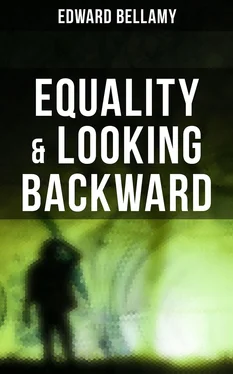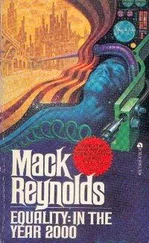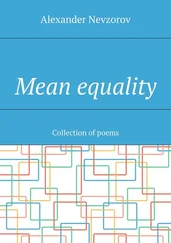“The cost must be very great,” I said.
“If it took half the revenue of the nation, nobody would grudge it,” replied Dr. Leete, “nor even if it took it all save a bare pittance. But in truth the expense of educating ten thousand youth is not ten nor five times that of educating one thousand. The principle which makes all operations on a large scale proportionally cheaper than on a small scale holds as to education also.”
“College education was terribly expensive in my day,” said I.
“If I have not been misinformed by our historians,” Dr. Leete answered, “it was not college education but college dissipation and extravagance which cost so highly. The actual expense of your colleges appears to have been very low, and would have been far lower if their patronage had been greater. The higher education nowadays is as cheap as the lower, as all grades of teachers, like all other workers, receive the same support. We have simply added to the common school system of compulsory education, in vogue in Massachusetts a hundred years ago, a half dozen higher grades, carrying the youth to the age of twenty-one and giving him what you used to call the education of a gentleman, instead of turning him loose at fourteen or fifteen with no mental equipment beyond reading, writing, and the multiplication table.”
“Setting aside the actual cost of these additional years of education,” I replied, “we should not have thought we could afford the loss of time from industrial pursuits. Boys of the poorer classes usually went to work at sixteen or younger, and knew their trade at twenty.”
“We should not concede you any gain even in material product by that plan,” Dr. Leete replied. “The greater efficiency which education gives to all sorts of labor, except the rudest, makes up in a short period for the time lost in acquiring it.”
“We should also have been afraid,” said I, “that a high education, while it adapted men to the professions, would set them against manual labor of all sorts.”
“That was the effect of high education in your day, I have read,” replied the doctor; “and it was no wonder, for manual labor meant association with a rude, coarse, and ignorant class of people. There is no such class now. It was inevitable that such a feeling should exist then, for the further reason that all men receiving a high education were understood to be destined for the professions or for wealthy leisure, and such an education in one neither rich nor professional was a proof of disappointed aspirations, an evidence of failure, a badge of inferiority rather than superiority. Nowadays, of course, when the highest education is deemed necessary to fit a man merely to live, without any reference to the sort of work he may do, its possession conveys no such implication.”
“After all,” I remarked, “no amount of education can cure natural dullness or make up for original mental deficiencies. Unless the average natural mental capacity of men is much above its level in my day, a high education must be pretty nearly thrown away on a large element of the population. We used to hold that a certain amount of susceptibility to educational influences is required to make a mind worth cultivating, just as a certain natural fertility in soil is required if it is to repay tilling.”
“Ah,” said Dr. Leete, “I am glad you used that illustration, for it is just the one I would have chosen to set forth the modern view of education. You say that land so poor that the product will not repay the labor of tilling is not cultivated. Nevertheless, much land that does not begin to repay tilling by its product was cultivated in your day and is in ours. I refer to gardens, parks, lawns, and, in general, to pieces of land so situated that, were they left to grow up to weeds and briers, they would be eyesores and inconveniencies to all about. They are therefore tilled, and though their product is little, there is yet no land that, in a wider sense, better repays cultivation. So it is with the men and women with whom we mingle in the relations of society, whose voices are always in our ears, whose behavior in innumerable ways affects our enjoyment — who are, in fact, as much conditions of our lives as the air we breathe, or any of the physical elements on which we depend. If, indeed, we could not afford to educate everybody, we should choose the coarsest and dullest by nature, rather than the brightest, to receive what education we could give. The naturally refined and intellectual can better dispense with aids to culture than those less fortunate in natural endowments.
“To borrow a phrase which was often used in your day, we should not consider life worth living if we had to be surrounded by a population of ignorant, boorish, coarse, wholly uncultivated men and women, as was the plight of the few educated in your day. Is a man satisfied, merely because he is perfumed himself, to mingle with a malodorous crowd? Could he take more than a very limited satisfaction, even in a palatial apartment, if the windows on all four sides opened into stable yards? And yet just that was the situation of those considered most fortunate as to culture and refinement in your day. I know that the poor and ignorant envied the rich and cultured then; but to us the latter, living as they did, surrounded by squalor and brutishness, seem little better off than the former. The cultured man in your age was like one up to the neck in a nauseous bog solacing himself with a smelling bottle. You see, perhaps, now, how we look at this question of universal high education. No single thing is so important to every man as to have for neighbors intelligent, companionable persons. There is nothing, therefore, which the nation can do for him that will enhance so much his own happiness as to educate his neighbors. When it fails to do so, the value of his own education to him is reduced by half, and many of the tastes he has cultivated are made positive sources of pain.
“To educate some to the highest degree, and leave the mass wholly uncultivated, as you did, made the gap between them almost like that between different natural species, which have no means of communication. What could be more inhuman than this consequence of a partial enjoyment of education! Its universal and equal enjoyment leaves, indeed, the differences between men as to natural endowments as marked as in a state of nature, but the level of the lowest is vastly raised. Brutishness is eliminated. All have some inkling of the humanities, some appreciation of the things of the mind, and an admiration for the still higher culture they have fallen short of. They have become capable of receiving and imparting, in various degrees, but all in some measure, the pleasures and inspirations of a refined social life. The cultured society of the nineteenth century — what did it consist of but here and there a few microscopic oases in a vast, unbroken wilderness? The proportion of individuals capable of intellectual sympathies or refined intercourse, to the mass of their contemporaries, used to be so infinitesimal as to be in any broad view of humanity scarcely worth mentioning. One generation of the world today represents a greater volume of intellectual life than any five centuries ever did before.
“There is still another point I should mention in stating the grounds on which nothing less than the universality of the best education could now be tolerated,” continued Dr. Leete, “and that is, the interest of the coming generation in having educated parents. To put the matter in a nutshell, there are three main grounds on which our educational system rests: first, the right of every man to the completest education the nation can give him on his own account, as necessary to his enjoyment of himself; second, the right of his fellow-citizens to have him educated, as necessary to their enjoyment of his society; third, the right of the unborn to be guaranteed an intelligent and refined parentage.”
Читать дальше










